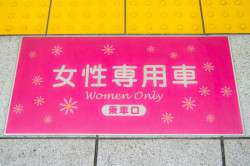
September 13, 2012
Space Invaders
The “small-apartment complex” hints at bigger issues in Japan
By Metropolis
Originally published on metropolis.co.jp on September 2012

In a society where stereotyping and racial homogeneity is pretty much the norm, it’s an interesting experience to be Japanese and not feel Japanese. Having spent most of my upbringing in Europe and the United States, the fact I look, speak and write Japanese doesn’t make it easier to be back here. Appearances suggest I’m just like the rest of the salarymen walking around with black blazers and pointy shoes. Inside, however, it’s a whole different story.
After coming to terms with spending double my San Francisco rent to get half the apartment space, I realized that this very small apartment—this little island of isolation—was very much the model of social interaction that, together with the salaryman, could shed a bit of light into why foreigners remain so excluded in Japan.
“Too many people in too small a country,” must cease to be the excuse for Japan’s infatuation with all things small—be it apartments, bonsai or cars. Japan is undoubtedly a small landmass, but continually thinking small erodes the ability to think big. Part of thinking big is having an open-minded attitude towards those who look different from you.
This year, a report released by the Tokyo Metropolitan Government showed more people are living alone in Tokyo than ever before. This could be as much a symptom of social isolation as a byproduct of urban planning. The small apartment is a rest stop for the evening, a place to recharge between days, but hardly the place for hosting social engagement.
Tokyo’s ubiquitous inhabitant—the hard-working, self-effacing salaryman—has no space or time to interact with foreigners except perhaps at work. But even the pragmatic approach Rakuten took to use English as its business language betrays its lack of understanding that working with foreigners is not the same as speaking their language.
The fact that so many foreigners are working as English teachers in Japan reinforces a stereotype—a self-fulfilling prophecy of sorts. It’s difficult for many fluent English-speaking foreigners to land non-teaching jobs in Japan because of the language and culture barrier. Thus society here creates “buckets” into which foreigners can be easily put—those who teach English on one hand, and the less numerous whose Japanese fluency makes them objects of admiration on TV. This circus show must not be allowed to create deeper rifts of misunderstanding and bias.
Attitudes towards gaijin need to change from the inside out. The numbers suggest, however, that this will be difficult. Fewer Japanese students are studying abroad than ever before, despite government incentives. The reasons for the decline range from increased introversion and risk-averseness to education fatigue as a result of a grueling and unforgiving college admissions process. The idea of studying outside of Japan becomes a choice between being thrust into an unfamiliar environment, language, and culture, and the easy route of ignoring that opportunity in favor of the status quo.
Perhaps a more forceful motivation lies in recognizing the fierce competition from those who are more globally aware. In fact, foreigners with specialized skills are being hired more and more into Japanese firms: last year, 80% of the new hires at Panasonic were non-Japanese. Unless Japanese people can understand what it’s like to be the strangers in a strange land—and step outside their personal comfort zones—Japan will risk becoming, as the director of the MIT Media Lab, Joi Ito, said, “less and less relevant” on the global stage.







